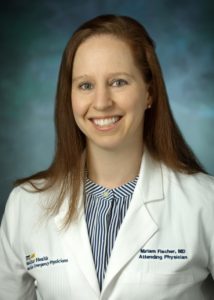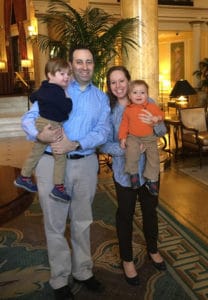-
03 April 2020

 In some ways, life for Dr. Miriam Fischer Wachter during the coronavirus pandemic doesn’t feel all that different than it did before. With her husband Eric, she has two small children at home, and she works full-time as a doctor in an emergency room, so life was already hectic.
In some ways, life for Dr. Miriam Fischer Wachter during the coronavirus pandemic doesn’t feel all that different than it did before. With her husband Eric, she has two small children at home, and she works full-time as a doctor in an emergency room, so life was already hectic.
“I’m in the ER, and it’s crazy, and it’s busy, and there’s lots of sick people,” Dr. Wachter says. “It’s just more complicated [now]. I feel like I’m carrying a heavier weight, and I have more responsibility, both to society and then to … my family, [to] be present and not get them sick.”
Dr. Wachter is an Attending Physician in Emergency Medicine at MedStar Washington Hospital Center and Assistant Professor at the Georgetown University School of Medicine. To care for coronavirus patients, she describes an arduous process of getting dressed, putting on masks and other personal protective equipment (PPE), and dealing with the added anxiety of seeing patients who are sick with a contagious disease.
Nevertheless, Dr. Wachter says she loves her work—now and always. The work is challenging and exciting and “every once in a while, you have a win, and it feels really good,” she says.
A win can look different depending on the patient. Sometimes, she’s helping a patient suffering from coronavirus recover and leave the hospital healthy. Other times, she’s helping a patient die with dignity.
“There was an 82-year-old woman, and she’s dying of coronavirus. We helped her die the way she wanted to,” Dr. Wachter says. “We don’t allow visitors, but we managed to get her on FaceTime with her family. [We got] her a goodbye.”
The ways she’s helping patients point to the Jewish values that are important to her—and that motivated her to pursue a career as a doctor in the first place.
“I truly believed, from early on, in the idea of pikuach nefesh, [that] saving a life is the holiest of holy things you can do and the most you can do for the community,” Dr. Wachter says.
The second principle Dr. Wachter values is the notion of giving anonymously. “Most of the people whose lives I save never know my name or who I was because they were so sick they’ll never remember me,” she says. And the family of the 82-year-old woman will likely never know who held the phone that allowed them to say goodbye to their mother and grandmother.
Throughout the coronavirus pandemic, Dr. Wachter has been grateful and proud of how the many communities she is a part of have responded to the crisis, in ways both big and small. “I’ve been really impressed with how the community has modified to fit the needs that we have right now,” she says. “To find creative ways to change what we do for the times.”
“I truly believed, from early on, in the idea of pikuach nefesh, [that] saving a life is the holiest of holy things you can do and the most you can do for the community.”—Dr. Miriam Wachter
The Greater Washington community as a whole is doing its part by listening to medical experts and staying home. “As much as it feels like you’re sitting at home and doing nothing, you’re doing a lot,” Dr. Wachter says.
She has also seen tremendous support for the various at-risk populations throughout our community. “It’s not just the doctors and nurses who are at risk. It’s the cleaning staff at the hospital. The people who work in the lab. The guy who, when you, in a rush, drop off your mom at the ER, gets in your dirty car and parks it for you,” Dr. Wachter says. “These are the people I’m seeing really, really sick with coronavirus.”
Institutions are working in big ways to help those in need. But Dr. Wachter is also heartened by the small ways individual people are offering support in whatever way they can give it. “These little, little actions that people have done just out of basic compassion,” she says. “It’s [people who say], ‘I’m going to help a neighbor. I’m going to help a friend. I’m going to take care of somebody.’”
This year, Dr. Wachter’s Passover seder, the ritual holiday ceremony and meal, was saved by a helpful colleague. “I was almost tearful at work one day over a patient, and then I said to my colleague, ‘And we have to do seder by ourselves, and we don’t [have what we need] because we are always with family,’” she said.
The next day, her colleague brought Dr. Wachter everything she would need. She gave her a bag filled with haggadot, the books that serve as a guide through the ceremonial seder; a Passover memory card game for her kids; a kit to perform bedikat chametz, the ritual of ridding the house of bread before the holiday; a kid-friendly, magnetized seder plate, an object that holds the important ritual objects of Passover; and more.
“She’s part of our community. She was worried about me and looking out for me. And she wanted to make sure that we had our chag [holiday],” Dr. Wachter says. “I feel very supported.”
The resilience of the Greater Washington community—both Jewishly and generally—are enabling Dr. Wachter and others to continue living a fulfilling life during this crisis.
The way people have followed stay-at-home orders “makes me proud to be a part of this community, and it makes me feel like this will pass as well and as smoothly as it can because people are doing the right thing,” Dr. Wachter says.
 And she has felt grateful that she can continue to live a Jewish life, for herself and for her family, during these challenging times. “Instead of saying, ‘This year, there’s no Pesach,’ we said, ‘This year … we’re going to do it in our own new, special way. [We’re] not putting our Judaism on hold,’” Dr. Wachter says. “It’s a resilience we’ve shown for 3,000 years. And this is just another challenge.”
And she has felt grateful that she can continue to live a Jewish life, for herself and for her family, during these challenging times. “Instead of saying, ‘This year, there’s no Pesach,’ we said, ‘This year … we’re going to do it in our own new, special way. [We’re] not putting our Judaism on hold,’” Dr. Wachter says. “It’s a resilience we’ve shown for 3,000 years. And this is just another challenge.”
Federation is working to empower those who are serving the community during the coronavirus pandemic to do the most good for the greatest number of people. To support our cause, please consider making a donation to the Jewish Community COVID-19 Response Fund.
